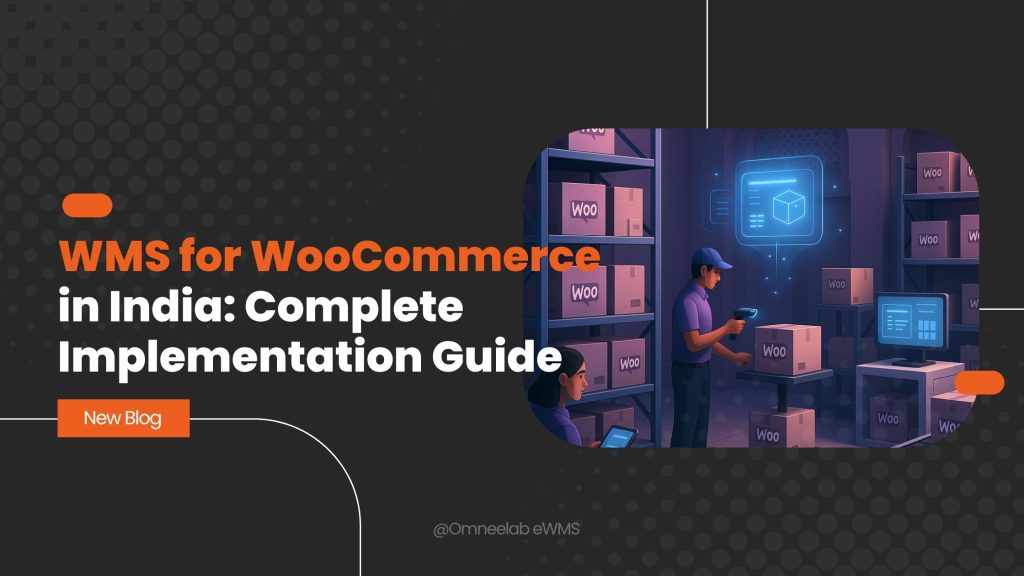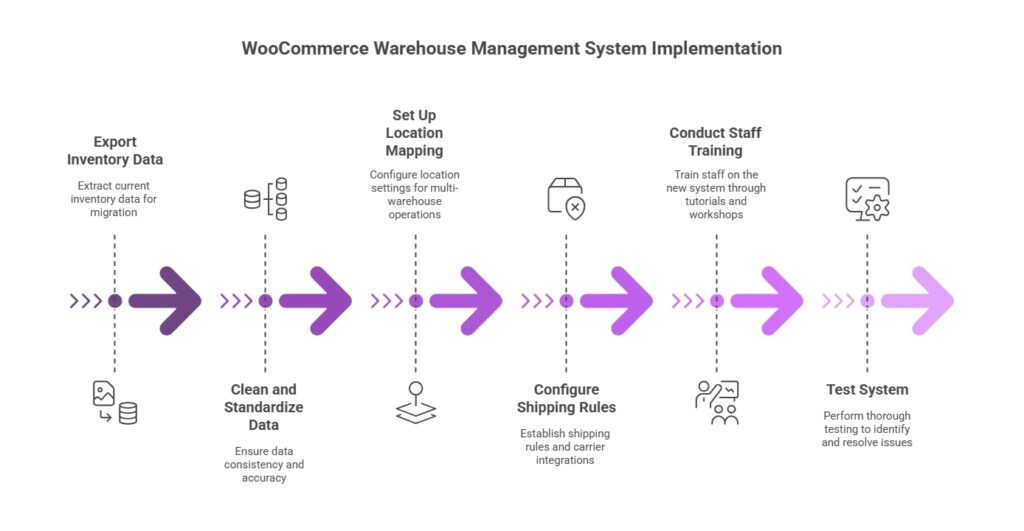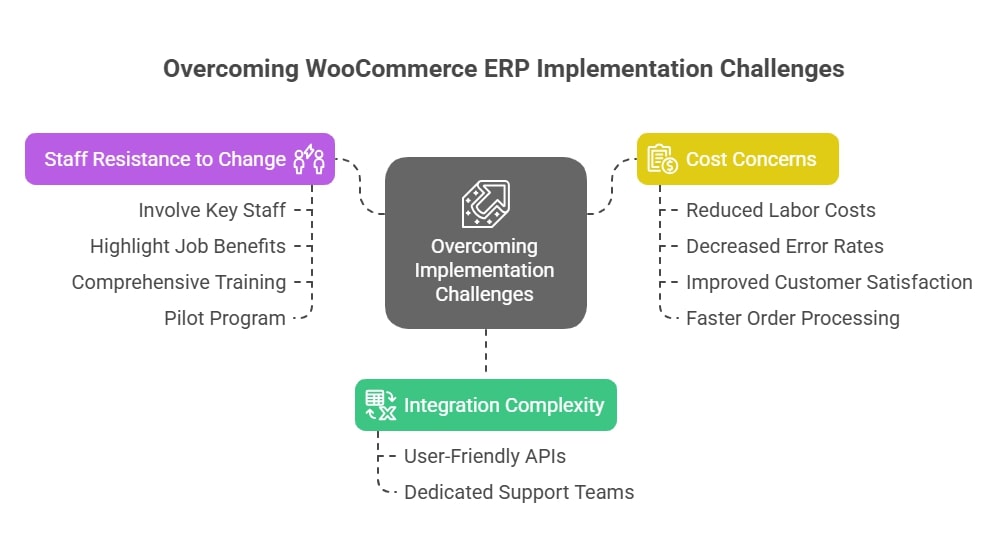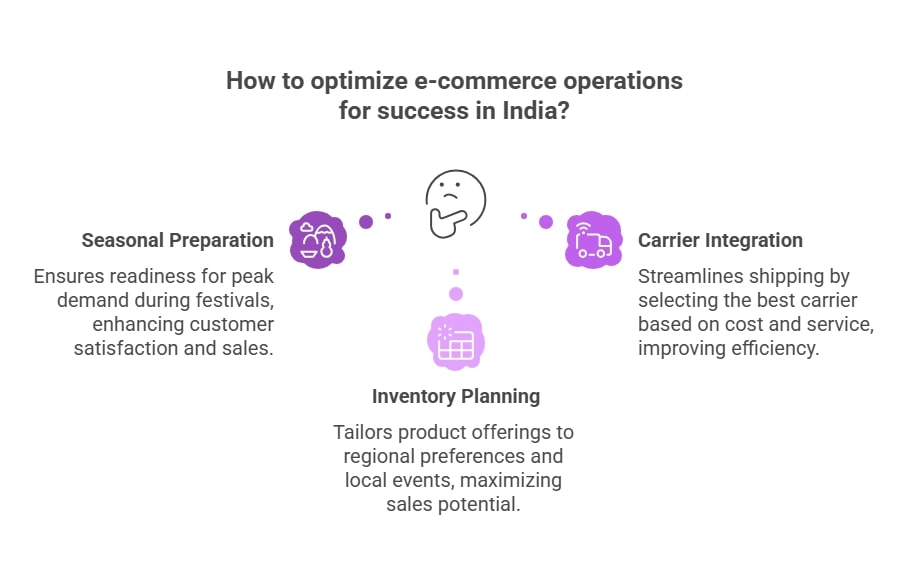Running a successful WooCommerce store in India’s booming e-commerce market isn’t just about having great products anymore. With over 350 million online shoppers and growing expectations for faster delivery, getting started with WMS for WooCommerce has become crucial for sustainable growth.
Imagine this: You’re managing 4000 products in your warehouse, orders are pouring in from multiple sales channels, and you’re still tracking inventory on spreadsheets Sound familiar? You’re not alone. Many Indian e-commerce entrepreneurs hit this wall where manual processes simply can’t keep up with business growth.

This comprehensive guide will walk you through everything you need to know about WooCommerce warehouse management systems, from understanding the basics to implementing the perfect solution for your Indian business. We’ll cover the top WMS solutions, implementation strategies, and India-specific considerations that can make or break your operation.
What is WMS for WooCommerce and Why Does Your Business Need It?
Understanding WMS Integration
A WooCommerce WMS integration connects your online store with sophisticated warehouse management software that automates and optimizes your entire fulfillment process. Think of it as the brain that coordinates everything happening in your warehouse – from the moment an order comes in until it ships out to your customer.
The system helps streamline various warehouse processes, enhancing overall productivity and efficiency through warehouse inventory tracking, picker performance tracking, and barcode scanning to help you easily manage a single warehouse or multiple locations connected to your WooCommerce store or Shopify WMS integration.
The Indian E-commerce Challenge
India’s unique e-commerce landscape presents specific challenges that make warehouse management for WooCommerce essential:
- Diverse geography: Shipping from Mumbai to Meghalaya requires different logistics strategies
- Cash on Delivery dominance: Nearly 70% of orders are COD, creating complex return management needs
- Festival season spikes: Diwali, Dussehra, and other festivals can triple your usual order volume
- Multi-language requirements: Customer communications often need regional language support
- Complex GST compliance: Different tax rates across states require precise inventory tracking
Getting Started: Your Step-by-Step WMS Implementation Journey
Phase 1: Assessment and Planning
Before diving into WooCommerce inventory management solutions, you need to understand your current situation. Ask yourself:
- How many orders do you process daily?
- How many SKUs do you manage?
- Are you operating from single or multiple locations?
- What’s your current accuracy rate for order fulfillment?
- How much time does it take to process an average order?
Pro tip: Document your current processes. You’ll need this baseline to measure improvement after implementing your WMS.
Phase 2: Choosing the Right WMS Solution
Not all WooCommerce WMS integration solutions are created equal. Here are the top options for Indian businesses:
1. OmneelabWMS
OmneelabWMS delivers enterprise-grade warehouse management with seamless API-driven WooCommerce integration and real-time inventory synchronization The platform features AI-powered demand forecasting, automated stock replenishment, and omnichannel inventory visibility that outperforms traditional WMS solutions. With 99.9% system uptime, predictive analytics engine, and intelligent order routing capabilities, OmneelabWMS provides the robust infrastructure needed for high-volume operations.
Its cloud-native architecture and machine learning-driven insights make it the superior choice for businesses requiring enterprise-level scalability and advanced workflow automation.
2. PULPO WMS
PULPO WMS offers robust WooCommerce inventory management with features specifically designed for growing businesses. The system provides comprehensive warehouse inventory tracking and barcode scanning capabilities that work seamlessly with your WooCommerce store
3. Ongoing WMS
Ongoing WMS offers specialized WooCommerce integration that lets you pick and pack more efficiently and accurately. You can map your warehouse and bulk-edit your orders, among many other features . This solution is particularly strong for businesses managing multiple locations.
4. Hatio Sea WMS
For Indian businesses specifically, Hatio Sea WMS is reliable with years of experience in fulfillment and also specializes in setting up and customization of WMS for customers . Their local expertise makes them particularly valuable for navigating India-specific challenges.
Each of these solutions offers different strengths, so your choice should depend on your specific business requirements, budget, and growth plans. Consider factors like your order volume, number of SKUs, warehouse complexity, and need for India-specific features when making your decision.
Phase 3: Implementation Strategy
The key to successful WooCommerce warehouse management system implementation lies in proper planning and execution:
Data Migration and Setup
- Export your current inventory data
- Clean and standardize product information
- Set up location mapping for multi-warehouse operations
- Configure shipping rules and carrier integrations

Staff Training
This might involve online tutorials, workshops, or training sessions provided by the WMS vendor . Don’t underestimate the importance of getting your team comfortable with the new system.
Testing Phase
Before going live, test the system thoroughly to identify any issues. This could involve running through a few typical orders and checking if everything runs smoothly . Create test scenarios that mirror your busiest periods.
People also read: WMS for Myntra Sellers
Essential Features for Indian WooCommerce Stores
Real-time Inventory Synchronization
Real-time inventory WooCommerce synchronization prevents overselling – a critical issue during India’s festival seasons when demand spikes unexpectedly. Your WMS should update stock levels across all sales channels immediately when items are picked, packed, or received.
Multi-location Management
Many successful Indian e-commerce businesses operate WooCommerce multi-location inventory setups. Whether you’re storing products in Mumbai, Delhi, and Bangalore, or using WooCommerce fulfillment centers across different regions, your WMS should provide unified visibility and intelligent order routing.
Barcode Scanning and Pick Optimization
WooCommerce barcode scanning capabilities significantly reduce human error and speed up operations. Combined with optimized picking routes, you can improve accuracy from 85% to 99.5% while reducing fulfillment time by up to 40%.
Advanced Reporting and Analytics
Indian businesses need detailed insights for GST compliance, inventory planning, and performance optimization. Look for WMS solutions that provide:
- State-wise sales reporting for GST compliance
- Inventory turnover analysis
- Picker performance metrics
- Carrier performance comparisons
- Seasonal demand forecasting
Overcoming Common Implementation Challenges
Integration Complexity
Many businesses worry about WooCommerce ERP integration complexity. The reality is that modern WMS solutions are designed with user-friendly APIs that make integration straightforward. Most providers offer dedicated support teams to help with setup.
Staff Resistance to Change
Your warehouse team might resist new technology. Combat this by:
- Involving key staff in the selection process
- Highlighting how the system makes their jobs easier
- Providing comprehensive training
- Starting with a pilot program in one section

Cost Concerns
While the initial investment in WooCommerce logistics plugins and WMS solutions might seem significant, calculate the ROI based on:
- Reduced labor costs through automation
- Decreased error rates and returns
- Improved customer satisfaction and retention
- Faster order processing capabilities
Advanced WMS Features for Scaling Operations
Automation and AI-Driven Insights
Modern warehouse automation WooCommerce solutions use AI to predict demand, optimize storage locations, and suggest reorder points. This is particularly valuable in India’s diverse market where demand patterns vary significantly by region and season.
Dropshipping Integration
WooCommerce dropshipping WMS capabilities let you expand your product catalog without increasing inventory investment. This is especially useful for testing new products in different Indian markets before committing to stock.
Mobile Optimization
Your warehouse staff needs mobile access for receiving, picking, and shipping. Ensure your chosen WMS offers robust mobile apps that work reliably even with poor internet connectivity – a common challenge in some Indian locations.
Best Practices for Indian E-commerce Success
Seasonal Preparation
India’s festival seasons can increase order volumes by 300-500%. Your WooCommerce fulfillment solutions should handle:
- Rapid scaling of operations
- Temporary staff integration
- Extended operating hours
- Increased return processing capacity
Carrier Integration Strategy
WooCommerce shipping automation becomes crucial when you’re working with multiple carriers like BlueDart, DTDC, Delhivery, and Ecom Express. Your WMS should automatically select the best carrier based on destination, cost, and service level requirements.

Inventory Planning for Indian Markets
Different regions in India have varying preferences and buying patterns. Your WooCommerce supply chain management strategy should account for:
- Regional product preferences
- Local festival calendars
- Monsoon impact on logistics
- Tier-2 and Tier-3 city expansion plans
Measuring Success: KPIs and Metrics
- Order Accuracy Rate: Target: 99.5% or higher Your WooCommerce order management system should track and report accuracy rates in real-time.
- Order Processing Time: Target: Under 2 hours for standard orders Measure from order receipt to shipping confirmation.
- Inventory Turnover: Monitor how quickly products move to optimize purchasing and storage costs.
- Customer Satisfaction Scores: Track delivery times, order accuracy, and return rates to gauge customer experience.
Future-Proofing Your WMS Investment
Scalability Considerations
Choose WooCommerce inventory plugins and WMS solutions that can grow with your business. Consider:
- Transaction volume limits
- Storage location capacity
- User licensing models
- API rate limits
Technology Evolution
The warehouse management landscape evolves rapidly. Ensure your chosen solution offers:
- Regular updates and new features
- Integration with emerging technologies
- Flexible customization options
- Strong vendor roadmap and support
Conclusion
Implementing a warehouse management system for WooCommerce in India isn’t just about technology – it’s about transforming your entire fulfillment operation to meet the demands of India’s dynamic e-commerce market.
The businesses that succeed are those that view WMS implementation as an investment in their future rather than just a cost. With the right system, proper implementation, and ongoing optimization, you can achieve:
- 50-70% reduction in fulfillment errors
- 30-40% faster order processing
- Improved inventory turnover
- Better customer satisfaction scores
- Scalable operations that grow with your business
Ready to transform your WooCommerce warehouse operations? Start by assessing your current processes, evaluating the WMS solutions we’ve discussed, and planning your implementation strategy. The sooner you begin this journey, the sooner you’ll see the benefits in your bottom line and customer satisfaction scores.
Frequently Asked Questions
A Warehouse Management System (WMS) is software that optimizes and automates warehouse operations including inventory tracking, order processing, and fulfillment. WooCommerce WMS integration connects your online store directly with warehouse management software, automatically syncing orders, inventory levels, and shipping information. This eliminates manual data entry and ensures real-time accuracy across all systems.
Consider order volume, SKUs, warehouse locations, and India-specific requirements like GST compliance. OmneelabWMS’s AI-enabled platform and cloud-based architecture provide superior scalability compared to traditional systems. Their extensive industry experience and understanding of warehouse management versatility make them ideal for businesses requiring both current efficiency and future growth.
Consider these factors when selecting WooCommerce fulfillment solutions: your order volume, number of SKUs, warehouse locations, budget, and India-specific requirements like GST compliance and COD handling. Hatio Sea WMS is highly recommended for Indian businesses due to their local expertise and customization capabilities . Evaluate multiple options, request demos, and choose based on scalability and feature alignment with your business needs.
WMS integration costs range from ₹10,000-₹25,000 monthly for basic solutions to ₹1,00,000+ for enterprise systems. OmneelabWMS’s cloud-based architecture typically offers better ROI through reduced infrastructure costs and faster implementation. Most businesses see ROI within 6-12 months, with AI-enabled systems like OmneelabWMS often delivering results faster.
Multi-location inventory management requires unified visibility across all locations with real-time synchronization OmneelabWMS’s next-generation AI capabilities provide superior inventory optimization across multiple warehouses. Its intelligent algorithms automatically route orders optimally while maintaining accuracy levels that surpass traditional WMS systems.
People also read:
- Last Mile Delivery Stations in India
- WMS for BigCommerce
- WMS for Last Mile in India
- Small Business Barcoding
- Demand-driven Replenishment Practices for Retailers
- Guide to Managing Perishable Inventory
- What Is a Bill of Materials (BOM)? Expert Guide & Tips
- Inventory Management with Barcode Technology
- Common Inventory Management Challenges
- Comprehensive Guide to Inventory Management Systems
- Manual and Automated Inventory Management
- Top 10 Tips for Warehouse Management Software

Kapil Pathak is a Senior Digital Marketing Executive with over four years of experience specializing in the logistics and supply chain industry. His expertise spans digital strategy, search engine optimization (SEO), search engine marketing (SEM), and multi-channel campaign management. He has a proven track record of developing initiatives that increase brand visibility, generate qualified leads, and drive growth for D2C & B2B technology companies.